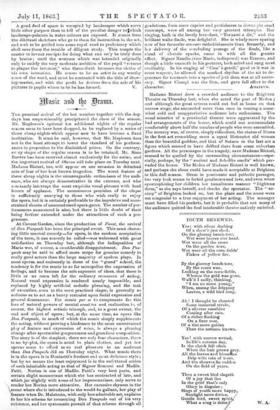Music ait tc !MM.
Tan punctual arrival of tire hot weather together with the dog- days has unquestionably precipitated the close of the season. Mr. Mapleson's optional ten additional nights of the regular sermon seem to have been dropped, to be replaced by a series of those cheap nights which appear now to have become a fixed institution. It must be said, however, that Mr. Mapleson does not in the least attempt to lower the standard of his perform- ances in proportion to the diminished prices. On the contrary, ev.:ry singer of the regular season is to be retained, Mr. Sims Reeves has been reserved almost exclusively for the series, and the important revival of Oberon will take place on Tuesday next. Madame Ristori, too, will appear on one occasion in detached acts of four of her best known tragedies. The worst feature of these cheap nights is the unmanageable enthusiasm of the audi- ence, who are always demonstrative in the extreme, and who conttantly interrupt the most exquisite vocal phrases with loud bursts of applause. The monotonous precision of the claque is sufficiently annoying to those who wish really to enjoy the opera, but it is certainly preferable to the impulsive and unre- strained shouts of unaccustomed opera-goers. The number of per- formances announced is nine, but there is little doubt of their being further extended under the attractions of such a pro- gramme.
At Covent Garden, since the production of Faust, the revival of Don Pasquale has been the principal event. This most charm- ing little musical comedy—for opera, in the modern acceptation of the term, it can scarcely be called—was welcomed with great satisfaction on Thursday last, although the indisposition of Mario was, of course, a considerable disappointment. Don Pas- quale may be said to afford more scope for genuine comedy to really good actors than the large majority of spoken plays. In most Operas, and eminently in those of the "grand" school, the tendeacy is for the music to so far monopolize the expression of feelings, and to become the sole exponent of ideas, that there is little or no room left for the ordinary resources of acting. Natural vocal expression is rendered nearly impossible, and replaced by highly artificial melodic phrasing, and the task of execution, even to the most practised singer, is generally so arduous as to act as a heavy restraint upon facial expression and general demeanour. For music per se to compensate for this loss of natural powers of mental creat:on and realization i., of course, the highest artistic triumph, and, to a great extent, the end and object of opera; but, at the same time, an opera like Don Pasquale, in much of which the music simply supplements the acting, without proving a hindrance to the most unrestrained play of feature and expression of voice, is always a pleasing change after spectacular gorgeousness and grandiose composition. The story is of the simplest; there are only four characters, there is no by-plot, the opera is acted in plain clothes, and yet few operas seem to affJrd more real pleasure to an audience than Don Pasquaix did on Thursday night. What music there is in the opera is in Donizetti's freshest and most delicious style ; but by no means the least enjoyment is in the unfettered action of such inimitable acting as that of Signor Renconi and Male. Patti. NorMa is one of M.adlle. Patti's very best parts, and certain slight mannerisms which she has contracted of late, and which jar slightly with some of her impersonations, only serve to render her Norina more attractive. Her excessive shyness in the \ scene where she is introduced to the would-be gallant, her play of eature when Dr. Malatesta, with only less admirable art, explains tin her his scheme for tormenting Don Pasquale out of his very existence, and her systematic pursuit of that scheme through all A good deal of space is occupied by landscapes which serve gradations, from mere caprice and pettishness to downright cruel contempt, were all among her very greatest triumphs. Her singing, both in the lovely love-duet, " Toruami a dir," and the brilliant waltz-finale, was delightful. She is wisely more sparing now of her favourite staccato embellishments than formerly, and her delivery of the cencluding passage of the finale, like a cloud of electric sparks, came in with all the greater -effect. Signor Naudin (vice Mario, indisposed) was Ernesto, and though a little uncouth in his gestures, both acted and sang most creditably. In his singing of "Corn' 6 gentil," good as it was in some respect, he allowed the marked rhythm of the air to de- generate far too much into a species of jerk than was at all neces- sary. Signor Ciampi was the Don, and gave full effect to the



































 Previous page
Previous page